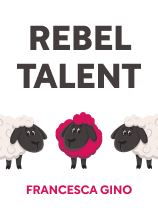

This article is an excerpt from the Shortform book guide to "Rebel Talent" by Francesca Gino. Shortform has the world's best summaries and analyses of books you should be reading.
Like this article? Sign up for a free trial here.
Why is rejecting labels important? What is the value of different viewpoints?
In Rebel Talent, Francesca Gino notes that rebels refuse to be limited by others’ definitions of them because they understand that people’s greatest potential and strength lie in their individuality. She also says that rejecting labels brings unique perspectives into conversations.
Keep reading to learn more about why you should reject labels.
Why Rejecting Labels Is Important
Reason 1: When you refuse to let people assign you a lane, you can create your own lane and help others do the same.
Gino says that when you reject labels that other people create for you and focus on possibilities instead of limitations, you can chart your own course and blaze a trail for others.
For example, tennis great Serena Williams defied categorization and obliterated the constraints of social norms, both on and off the tennis court, since she rose to prominence in the world of tennis at age 17. The winner of 23 Grand Slam titles, Williams has carved her own path by refusing to let others pigeonhole her as only a powerhouse athlete. She is also an advocate for racial and gender equality, a challenger of mainstream beauty norms, and a highlighter of racial health inequities. In her defiance of categorization, Williams has created a path for others to follow in her footsteps.
Reason 2: When you invite people with a range of experiences and viewpoints into the conversation, you come up with better ideas.
Gino says that bringing new voices to the table disrupts and challenges old and stale ways of thinking, which leads to innovation. She argues that disagreement and conflict, which are a natural part of having a range of viewpoints in the room, are in fact necessary, because they push groups to question basic assumptions and ideas and lead them to stronger, more well-thought-out conclusions
(Shortform note: In Principles: Life and Work, Ray Dalio explains that you can have “productive conflict” by focusing on what the right goal is, instead of on being right. Key ingredients to having “thoughtful disagreements include trying to understand where other people are coming from while being clear about how you see things; talking respectfully and without emotion; and bringing in an objective mediator if you’re unable to arrive at a consensus.)
Gino says that companies often shy away from including different voices and viewpoints because people are most comfortable when surrounded by others who think like them and agree with their ideas. This is partly because humans are hardwired to assess threats, so they don’t always trust people who don’t look or sound like them. Also, people often genuinely believe that processes are working best when everyone in the group is on the same page and getting along well—which is more likely to happen when everyone in the room thinks the same way.
But, Gino asserts, when groups are composed of only like-minded individuals, they’re at risk of “groupthink,” which curbs independent thought and the ability to innovate. (Shortform note: Groupthink is a phenomenon where members of a group reach a consensus not because they’ve critically examined issues, but because they have a strong need or desire to conform. Groupthink is problematic because it can lead to ill-informed decisions and create a self-perpetuating cycle that fuels group homogeneity and more groupthink. Because people engaged in this type of thinking prioritize group identity over independent thinking and different voices, they aren’t inclined to welcome “outsiders.”)
Finding Common Ground Is Good for the Greater Good
Rejecting labels and embracing a range of different viewpoints is perhaps more important now than ever. A 2018 study of online chat groups found a connection between mood and affect disorders and “absolutist” thinking—seeing the world through a rigid, “all or nothing” lens. Absolutist thinking prominently contributes to the highly polarized, divisive conversations that dominate social media and the airwaves today. Homogenous groups reinforce absolutist thinking by repeatedly reiterating in-group opinions and ideas without challenge. You can avoid absolutist thinking by embracing different viewpoints.
In addition to avoiding absolutist thinking, you can also avoid “negative conflict” in the workplace by choosing to engage in “positive conflict,” which focuses on genuinely trying to understand divergent viewpoints to come to a resolution rather than arguing your point to “win.” Positive conflict can increase efficiency, trust, emotional intelligence, and alignment on teams. It centers on six key steps: Listen to others so they feel heard, use “I” statements rather than point fingers, identify the root of the conflict, praise people with dissenting viewpoints to gain their trust, and look for opportunities to compromise.

———End of Preview———
Like what you just read? Read the rest of the world's best book summary and analysis of Francesca Gino's "Rebel Talent" at Shortform.
Here's what you'll find in our full Rebel Talent summary:
- Why you should tap into your inner rule breaker
- A guide on how to break the rules constructively
- The three principles for becoming a rebel leader






